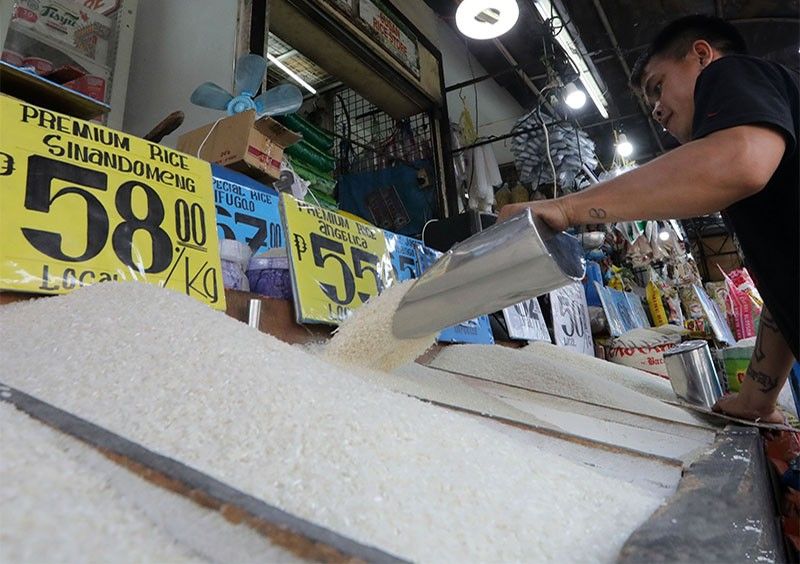DA: Local rice remains cheaper despite EO 62

MANILA, Philippines — The retail price of local rice remains cheaper compared to those of imported grains despite the implementation of Executive Order 62 on lower tariff on imported rice after the EO took effect on July 7, according to a ranking official of the Department of Agriculture (DA).
At a press conference yesterday, DA Assistant Secretary and spokesman Arnel de Mesa said the retail price of local well-milled rice was pegged at P45 per kilo compared to imported well-milled rice at P51 per kilo.
“The retail price of local rice is still lower. Before (EO 62) takes effect, let us give it some time that the imported rice is released and distributed,” De Mesa added.
EO 62 reduced the tariff on imported rice to 15 percent from 35 percent.
Based on the monitoring of the DA in Metro Manila markets, the retail price of local regular milled rice ranged between P45 and P50 per kilo; local well-milled rice, between P48 and 55 per kilo; local premium rice, between P50 and P58 per kilo and local special rice, between P57 and P65 per kilo.
Imported regular milled rice price ranged between P46 and P51 per kilo; imported well-milled rice, between P51 and P55 per kilo; imported premium rice, between P52 and P60 and imported special rice, between P55 and P65 per kilo.
Amid this development, the National Food Authority (NFA) will continue to procure palay after farmers complained of a P5-per-kilo drop in its farmgate price because of EO 62, according to De Mesa.
“On the part of the department, we continue to buy palay from the farmers. The NFA procures palay at high price and, according to the secretary, the Council will adjust accordingly and we are seeking additional budget for the NFA for this purpose,” he added, referring to Agriculture Secretary Francisco Tiu Laurel Jr.
Former DA secretary Leonardo Montemayor has warned of a further slump in the buying price of palay during the main harvest season in the last quarter of the year.
With the P5-per-kilo drop in the farmgate price of palay, farmers are suffering losses, according to Montemayor.
Farmers’ groups have asked the Supreme Court to issue a temporary restraining order against EO 62 as they asked that the order be declared unconstitutional.
Onion import ban extended
In another development, the temporary import ban on onions would be extended until the end of next month as current stocks remain ample to meet domestic demand, Tiu Laurel said yesterday.
The agriculture chief added that the DA would extend the import ban on a monthly basis based on the movement of supplies and demand in the market.
This is now the second extension of the import ban on red onion, which started in January.
Initially, the ban would have been lifted by May, but it was extended until this month due to bumper harvest in the first half of the year, resulting in overflowing stocks in cold storages.
“We are monitoring everything closely, day-to-day. As of the moment, we really do not need to import,” Tiu Laurel said.
The agriculture chief is cautious that the pronouncements on extending the import ban could encourage unscrupulous traders to slow down the release of their stocks from cold storage, thus jacking up market prices.
Tiu Laurel, however, warned unscrupulous onion traders who attempt to tighten the release of their stocks to make a killing, that he would not hesitate to allow onion imports to stabilize market prices.
The country usually imports the deficit in its onion production to meet overall demand and keep prices stable.
Cold storages are brimming with red onion stocks, holding over 150,000 metric tons (MT) as of July 5, based on the latest government monitoring report.
The supplies, all locally produced, are projected to last for 261 days or until March 23 next year.
Meanwhile, yellow onion stocks of about 10,600 MT would last for 72 days or until Sept. 15, according to the government report.
Combined red and yellow onion supplies will last for 223 days or until the middle of February next year.
Retail prices of locally produced red and yellow onions in Metro Manila markets have been stable since the start of the year.
Red onion prices range from P80 per kilo to P150 per kilo, while yellow onions fetch P80 per kilo to P130 per kilo, based on the latest DA price monitoring report. — Jasper Emmanuel Arcalas
- Latest
- Trending





























